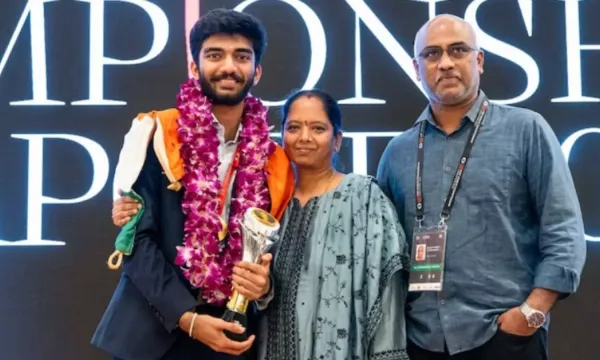
18-year-old D Gukesh has become a national sensation by becoming the youngest world champion recently. He defeated Ding Liren of China in the World Chess Championship final in the 14th and final game to win the crown in Singapore.
Behind his rise to the pinnacle of the chess world stands a proud mother, Padma Kumari, who beams with pride at her son’s remarkable achievements.
“We are very, very happy. First of all, I want to thank God for everything. Without him, nothing would have been possible,” Padma told ChessBase India.
When asked about her reaction to Gukesh becoming only the second Indian since Viswanathan Anand to win the World Championship, Padma said: “I did not watch it live. It was my sister-in-law who called me and told me that he became a champion. After that, I was continuously crying for 10 minutes. All the emotions came out. After that, we settled down.”
Despite being the mother of a chess prodigy, Padma admits she does not follow the intricacies of the game.
“First of all, I do not understand chess,” said Padma. “I can only see bars going up and down, and the next thing is that I feel very much stressed about it. I do not follow any of Gukesh’s games. I just see the results after the games are over,” she explained.
However, a pre-game ritual remains a constant in their bond. “Since his younger days, Gukesh has had the habit of calling me before the game. Short conversations we used to have, so at the World Championship before every game he had called me,” Padma revealed.
Unwavering faith
The World Chess Championship was a nerve-wracking experience, especially when the contestant was too young to handle the mountainous pressure, but Padma’s faith never wavered.
“First of all, I want to say one thing: when Gukesh and Raj (Rajinikanth) left for the World Championship, I told him to bring back our son as the 2024 world champion. Gukesh’s father did not say yes or no but said ‘umm’. That means a lot,” she said.
“The first match he lost, I understood it was because of his nervousness. He is a kid after all, an 18-year-old, but I always had the confidence in that he would settle down,” she stated.
The seven-drawn games in the neck-to-neck battle against China’s Ding Liren tested Gukesh’s resolve.
Padma shared that while Gukesh missed several opportunities, she always held steadfast to the belief that something positive was destined to unfold.
“There were many missed chances for Gukesh as well as Ding. But I believed there would be a breakthrough, and it came from Gukesh. After that, I was a little relaxed, but in the next game again he lost. But I believed something good would happen,” said Padma.
Doubts crept in
The mother, meanwhile, opened up about the doubts and risks the family faced in supporting Gukesh’s aspiration to play chess.
“There are many critical moments when we doubted ourselves. I do not know how to say it exactly. Whenever he did not play well, we used to wonder whether we had made the right decision for him. He was very young, and it was our responsibility to make decisions for him. You know, he did not go to school after fourth or fifth grade,” said Padma, revealing the trouble they went through.
The decision to prioritise chess over formal education is not easy for any parents. It was no different for Padma and Rajinikanth. “In India or anywhere it is a big decision. For any child, not studying is risky. It was a risk-taking moment, deciding whether it was appropriate to stop his studies and put him fully into chess,” Padma admitted.
She also revealed their feeling when they doubted their decision to allow Gukesh to play chess.
“Whenever he achieved something or his rating improved, we felt happy, like we were on the right path. But as parents, whenever he did not do well in a tournament, we doubted ourselves – not Gukesh, but our decision. This happened many times, especially during his younger days,” revealed Padma.
“But as he matured, we could see how disciplined and hardworking he was. That gave us confidence. We knew he would definitely come up,” she added.
The unconventional path they chose came with challenges and societal scrutiny.
“Not sending him to school was such a tough call, and even now, many people say we took a risk. You know, choosing a different path – keeping him out of school and putting him fully into chess – came with so much uncertainty. Initially, we thought we’d wait till 8th grade and then decide. But even after 9th grade, we saw him showing improvement, so we kept going. By God’s grace, everything went well,” Padma recounted.
Gukesh’s triumph as the world champion not only showcased his prowess as a chess player but also validated his parents’ unwavering faith in his potential.
“This – seeing Gukesh become the world chess champion – is the first time I feel we made the correct decision. He would not have been able to balance both school and chess. When you focus entirely on one thing – your passion – you can definitely shine,” demonstrated Padma.